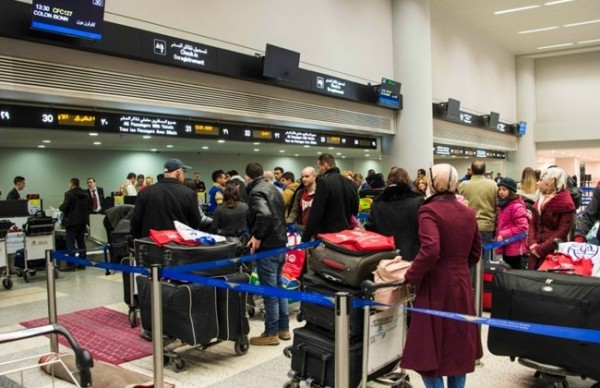
Four hundred Syrians who were trying to fly to Turkey were stopped at the Beirut airport on Friday and were being forced to return to Damascus instead, in a chaotic episode that illustrated how options are narrowing for those trying to flee the war in Syria.
The state-run National News Agency of Lebanon said that the passengers were being turned back because of new Turkish regulations that require Syrians to have a visa to enter the country by air or sea. The new rules, which took effect Friday, close off what had been one of the easiest ways out of the country for Syrians who could afford airfare or ferry tickets, and a primary route for those planning to try to reach Western Europe on smugglers’ boats.
It was not clear how many of the 400 passengers were refugees.
Many of those turned back on Friday had apparently been rushing to reach Turkey before the new visa rules took effect. Border crossings between Syria and Lebanon have been crowded in recent days with people intending to travel on to Turkey. (It is not possible now to fly there directly from Syria.)
Human rights groups quickly raised the question of whether the deportations violated Lebanon’s international obligation to refrain from sending refugees back to countries where they may be in danger.
“By forcibly returning more than 100 refugees to Syria, the Lebanese government has stooped to a shocking new low, and is putting these people in mortal danger,” said Sherif Elsayed-Ali of Amnesty International, referring to the first of several batches of passengers being sent back to Damascus. “This is an outrageous breach of Lebanon’s international obligations to protect all refugees fleeing bloodshed and persecution in Syria. The Lebanese government must halt all further deportations of refugees from Syria immediately.”
According to Amnesty International, the passengers who were turned away on Friday had been scheduled to fly to Turkey on Thursday, but their flights were canceled.
The authorities said that 164 of the passengers had gotten as far as boarding a flight on Friday, only to be pulled off as the plane was about to take off.
A spokesman for the Turkish Foreign Ministry, Tanju Bilgic, said the visa rules were intended to control “illegal immigration.” Turkey says that its land border with Syria will remain open and that the country will continue to welcome Syrian refugees. Turkey has closed the crossings several times during large surges of refugees, for example when thousands of Syrian Kurds fled last year from an assault on the border town of Kobani by Islamic State fighters.
Reaching the land border now would be very difficult for most Syrians, who would first have to pass through many different government, rebel and Islamic State checkpoints and traverse areas that are frequently hit by airstrikes.
There are now more than one million Syrians in Lebanon, and the new Turkish visa rules leave them with very few options if they must leave Lebanon in an emergency or for security reasons. The close relationship between Lebanon’s most powerful political faction, Hezbollah, and the Syrian government leaves some anti-government refugees feeling more vulnerable in Lebanon than in Turkey, which opposes President Bashar al-Assad.
More than four million Syrians have fled the country’s five-year civil war, which has killed more than 250,000 people. Seven million more are displaced within the country. Syrians accounted for about half of the one million refugees and migrants who reached the European Union last year.
Syrians once enjoyed visa-free travel to many Arab countries, but the years of Arab uprisings, sectarian conflicts and refugee flows have prompted many countries to impose new barriers to travel.
Lebanon, too, has tightened restrictions and now requires Syrians who enter the country to have plane tickets, hotel reservations, business plans, employer sponsorship or proof of an urgent humanitarian need.
Jordan does not require visas, but some Syrians are interrogated and deported on arrival at the Amman airport, and most of Jordan’s land borders are effectively closed, leaving would-be entrants languishing in desolate areas.
The episode in Beirut on Friday unfolded on a day of turbulent wind and waves on the Mediterranean Sea, which can be seen from the airport. Humanitarian activists posted warnings on social media that it was an especially bad day to attempt a sea crossing.
NY TIMES

Leave a Reply
You must be logged in to post a comment.